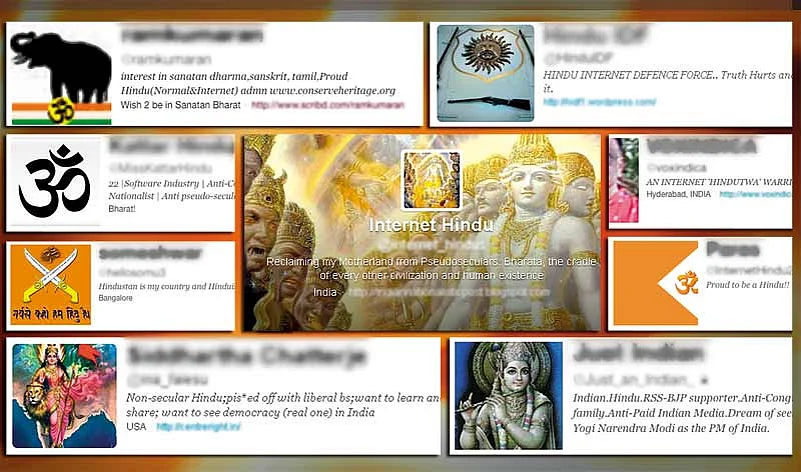How Many Seas Must...
- ”Mumbai rapist Mohammed Ansari got bail after 20 cases of robbery and molestation. No bail for Sadhvi Pragya & Col Purohit”
- ”If India had this paid media before 1947, we would still be under British rule.”
- ”Instead of being defensive, Gadkari should expose what pro-Cong intellectuals say of Vivekananda.”
- ”Government provides missionary visa...open invitation to carry out conversions.”
***
Siddhartha Chatterje is pretty much your conventional NRI techie, giving firms valuable tips on how to make the most of technology. But, when he is on Twitter, he has another avatar (@ma_falesu)—one who, in his words, is a “non-secular Hindu; pis*ed off with liberal bs; want to learn and share; want to see democracy (real one) in India”. Twitter is where Chatterje takes on public intellectuals who “preach lofty liberalism but practise a worse form of hypocrisy”. What was once just a hobby gradually became a calling.
Chatterje, who says he is “atheist-turned-religious”, is one of the growing clan of ‘Internet Hindus’. He is one of the rare ones to use his real name. “For me the term means standing against hypocritical, self-important elites who refuse to recognise that their old ways has kept India down for long,” he adds.
The term IHs goes back to a January 2010 tweet by CNN-IBN deputy editor Sagarika Ghose who had described them as “swarms of bees.... They come swarming after you at any mention of Modi, Muslims or Pakistan!”
“It is a term I coined to describe a specific group of people online who describe themselves as Hindu nationalists and who operate in well-organised groups to attack—in foul language—those perceived as liberal,” she says.
These are people who liberally retweet role models like Subramanian Swamy and Narendra Modi, but often use their anonymous identities to launch vicious and vulgar attacks on those who oppose right-wing views. An anonymous IH, who got online after Ghose’s remark and uses those two words in his online identity, argues they are there for a ‘healthy debate’. “Many Congresswalas use an IH mask to malign us,” he says.
Unlike what many believe, IHs are a disparate group, more united in their defence of Hindutva than divided by their many differences, whether it is on FDI or minorities. And, yes, most are men, which also explains the misogynist hatred Sagarika Ghose and Barkha Dutt are subjected to online. In March this year, some of their ilk found their Twitter handles blocked by the government when Bodoland violence had prompted online rumour-mongering. Journalist Kanchan Gupta, whose handle too was blocked and who refused an interview (saying the “story was predetermined”), defended IHs in an article: “...(they are) bright, well-educated, not burdened with regional and caste biases, amazingly well-informed on national issues and world affairs, rooted in Indian culture.... They hate being told they are wrong when they know they are right. They have a mind of their own and refuse to be led like sheep.”
And they are cognoscentes in using technology as their megaphone. “New religious groups such as the Neo-Pentecostals are more likely to be technologically adventurous as they have no legacy and consequently their risk appetite is much higher,” says Sunil Abraham, executive director of the Bangalore-based Centre for Internet and Society. The 1979 Islamic Revolution in Iran, for instance, was fuelled by the use of cassette tapes—a novelty then—in which Ayatollah Khomeini’s speeches were smuggled in from Iraq. A ‘Hindutva revolution’, if ever there is one, will be tweeted by these iPracharaks.
The Hindu right-wing (like its Islamist cousin) finds its voice in new technologies. Unlike the mainstream English media that leans to moderation, the internet is inherently an open space without a logic of internal restraint. It has been the Internet Hindu’s 21st century vahan. “It is because they do not see the argument that Godhra justified the riots in the media that they go online and troll so much,” says freelance journalist Shivam Vij. “Offline, nobody supports Hindus and their plight,” adds the anonymous IH.
An editor of a media website, the comments section of which has a large presence of Hindu right-wingers since 2000, says many of them are pesky, even hostile, NRIs. Someone wrote to him once, wishing his “head was severed by Shiva’s trident”. And that is among the less hostile and vulgar comments. “I think mostly these guys are losers who revel in any attention they can attract. So, when either Sagarika or Barkha replies to their comment, it gives them the high they want,” he says. “In a way, they also feed off each other.”
But Internet Hindu activism predates Twitter, to when numerous sites came up in the ’90s. “The RSS at one point actively trained people to write letters to editors,” says Harsh Kapoor, who helped set up sites that counter right-wing propaganda. In the internet era, the BJP has been preaching the use of social media vigorously. Dhruv Soi, a Delhi-based IT professional who joined the BJP recently, says he met many others like him at a recent party meet in Delhi. “Most of the newcomers were there because they see Narendra Modi as the saviour,” he says.
Other than adverse comments on Modi, what agitates IHs is the mainstream English media’s alleged failure to expose Congress’s votebank politics or criticise the Gandhi family. “In general, media is pro-Congress. Their leadership was a holy cow—until a certain Kejriwal came along. Why do so many reasonable people hold this view? Are they stupid? Or are they trying to make a point?” @ecophilo told Outlook. He thinks the term IH is “pejorative” and calls himself a “patriot Hindu”. The recent spate of reports criticising the Gandhi family, related to alleged corrupt deals, hasn’t helped. “I don’t think the anger is going down much; it’s being met with a bit of a triumphalist sentiment, as Modi moves from strength to strength. That the media—and the BJP—has abandoned chasing UPA scams has also left many dissatisfied,” Jaideep Prabhu, one of the editors of Centre Right India, an online portal, wrote to Outlook. For him Internet Hindu makes as much sense as ‘Internet Muslim’ or ‘Internet ManU’.
Vij, also a blogger now associated with the left-leaning opinion site Kafila.org, thinks the term is ‘counterproductive’. “That’s what right-wingers want. They think they are hated just for being Hindus and that people have a problem with religion,” he says. “The term is also symptomatic of what is wrong with our approach to Hindutva. Instead of demonising right-wingers, we need to engage with them, but left-liberals tend to address the converted and critique their own.” Sagarika Ghose, however, clarifies, “It is not a term for all Hindus or all right-wingers. I am not negating Mahashivratri, Durga Puja, the mahants who live in Benares—I am not taking on the entire panoply of Hindu civilisation.”
To be fair, there are many sane Hindu right-wingers just as there are not a few online loonies from the Islamic and Christian right in India. The former get noticed more because they are numerous. And few will disagree that it’s better to have them badger us online than do things far worse offline. As for the relative absence of left-leaning liberals on cyberspace, Vij seems to be of the view that they have always been ‘contemptuous’ of the internet and of dealing with the masses. But Mumbai-based writer Dilip D’Souza, who features in an online “hitlist of Hinduism’s enemies”, thinks right-wingers get noticed because they are more vocal: “I think these guys are neither Hindu nor nationalistic. All they want to do is anonymously abuse people they disagree with and thrash about their empty drums for mutual appreciation. I find it hard to take these guys seriously as long as they won’t engage in debate with their real names. Beat me in an open public debate—I have no problem with that.”


























